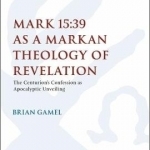Mark 15:39 as a Markan Theology of Revelation: The Centurion's Confession as Apocalyptic Unveiling
BookThis item doesn’t have any media yet
2017 | Philosophy, Psychology & Social Sciences
Jesus' arrest, trial and execution ends with the Roman centurion who oversees the death process proclaiming Jesus as God's son. This surprising exclamation occurs moments after Jesus has been put to death amidst a crowd of mockery. Gamel explores two key questions in relation to this moment: what does the centurion mean when he says that Jesus is God's son, and why does he say it? The confession is not made on the basis of any signs nor from any indication that he perceives Jesus' death as honourable or exemplary. The centurion's apparent lack of motivation itself highlights a key Markan theme that this insight is revealed by an apocalyptic act of God, signalled by the tearing of the temple veil. Thus, the confession, which we can understand to be made sincerely and knowledgeably, is the result of an act of God's revelation alone. The cross still has relevance for Mark's understanding of salvation as well as the identity of Jesus: Mark depicts a story in which all human characters exhibit varying levels of blindness to the spiritual realities that govern their lives. At the cross this blindness is decisively confronted by God's apocalyptic act.
The offer of sight to the centurion, then, demonstrates the reconciliation of God and humanity which are otherwise in Mark's Gospel repeatedly presented as antagonistic spheres. Finally the fact that revelation is offered to a Gentile highlights the inclusion of the nations into the promises of Israel.
Related Items:
| Published by | Bloomsbury Publishing PLC |
| Edition | Unknown |
| ISBN | 9780567673435 |
| Language | N/A |
Images And Data Courtesy Of: Bloomsbury Publishing PLC.
This content (including text, images, videos and other media) is published and used in accordance
with Fair Use.
